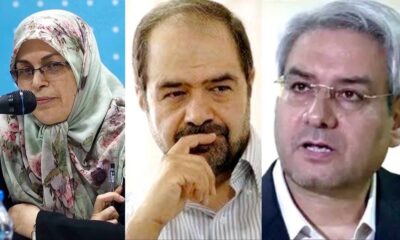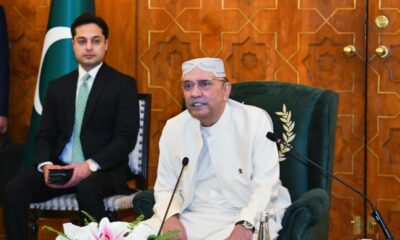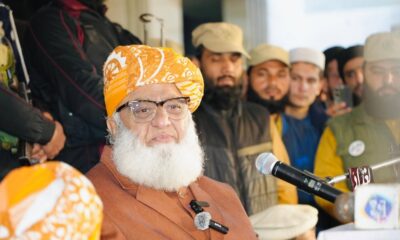World
Explosions rock Ukrainian capital Kyiv, mayor says
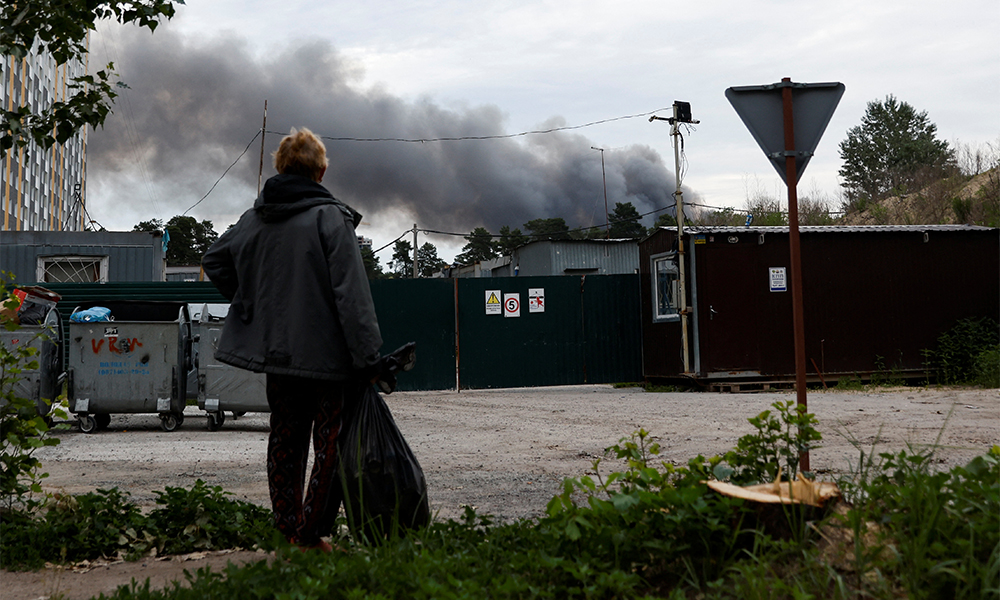
Kyiv was rocked by several explosions early on Sunday, the mayor of the Ukrainian capital said, a day after officials said troops had recaptured a swath of the battlefield city of Sievierodonetsk in a counter-offensive against Russia.
“Several explosions in Darnytskyi and Dniprovskyi districts of the capital,” Kyiv Mayor Vitali Klitschko wrote on the Telegram messaging app. “Services are already working on site. More detailed information – later.”
A Reuters witness saw smoke in the city after the explosions.
The Ukrainian claim on Sievierodonetsk could not be independently verified, and Moscow said its own forces were making gains there. But it was the first time Kyiv has claimed to have launched a big counter-attack in the small industrial city after days of yielding ground.
Sievierodonetsk Mayor Oleksandr Stryuk said street fighting continued during the day on Saturday, with both sides exchanging artillery fire.
“The situation is tense, complicated,” he told national television, saying there was a shortage of food, fuel and medicine. “Our military is doing everything it can to drive the enemy out of the city.”
Russia has concentrated its forces on Sievierodonetsk in recent weeks for one of the biggest ground battles of the war, with Moscow appearing to bet its campaign on capturing one of two eastern provinces it claims on behalf of separatist proxies.
Both sides claim to have inflicted huge casualties in the fighting, a battle that military experts say could determine which side has the momentum for a prolonged war of attrition in coming months.
In the diplomatic sphere, Kyiv rebuked French President Emmanuel Macron for saying it was important not to “humiliate” Moscow.
“We must not humiliate Russia so that the day when the fighting stops we can build an exit ramp through diplomatic means,” Macron told regional newspapers in an interview published on Saturday, adding he was “convinced that it is France’s role to be a mediating power.”
Ukrainian Foreign Minister Dmytro Kuleba tweeted in response: “Calls to avoid humiliation of Russia can only humiliate France and every other country that would call for it.
“Because it is Russia that humiliates itself. We all better focus on how to put Russia in its place. This will bring peace and save lives.”
Ukrainian President Volodymyr Zelenskiy offered a stark message: “The terrible consequences of this war can be stopped at any moment … if one person in Moscow simply gives the order,” he said, in an apparent reference to Russian President Vladimir Putin. “And the fact that there is still no such order is obviously a humiliation for the whole world.”
Putin will discuss the war in an interview due to be broadcast on national television on Sunday. In a brief excerpt aired on Saturday he said Russian antiaircraft forces have shot down dozens of Ukrainian weapons and are “cracking them like nuts”.
Ukraine says it aims to push Russian forces back as far as possible on the battlefield, counting on advanced missile systems pledged in recent days by the United States and Britain to swing the war in its favour.
Asked about Macron’s mediation offer on national television, Zelenskiy adviser Mykhailo Podolyak said there was “no point in holding negotiations” until Ukraine received all the pledged weapons, strengthened its position and pushed Russian forces “back as far as possible to the borders of Ukraine”.
Moscow has said the Western weapons will pour “fuel on the fire” but will not change the course of what it calls a “special military operation” to disarm Ukraine and rid it of nationalists.
Russia’s defence ministry said its troops were forcing the Ukrainians to withdraw across the Siverskiy Donets River to Lysychansk on the opposite bank.
Serhiy Gaidai, governor of Ukraine’s Luhansk province, which includes Sievierodonetsk, said Ukrainian forces previously in control of just 30% of the city had mounted a counter-attack, recapturing another 20% of it.
Gaidai said the Russians were blowing up bridges across the river to prevent Ukraine from bringing in military reinforcements and delivering aid to civilians in Sievierodonetsk.
“The Russian army, as we understand, is throwing all its efforts, all its reserves in that direction,” Gaidai said in a live TV broadcast.
Tens of thousands are believed to have died, millions have been uprooted from their homes, and the global economy has been disrupted in a war that marked its 100th day on Friday.
Ukraine is one of the world’s leading sources of grain and cooking oil, but those supplies were largely cut off by Russia’s closure of its Black Sea ports, with more than 20 million tonnes of grain stuck in silos.
World
Hong Kong tycoon Jimmy Lai sentenced to 20 years in jail in national security trial
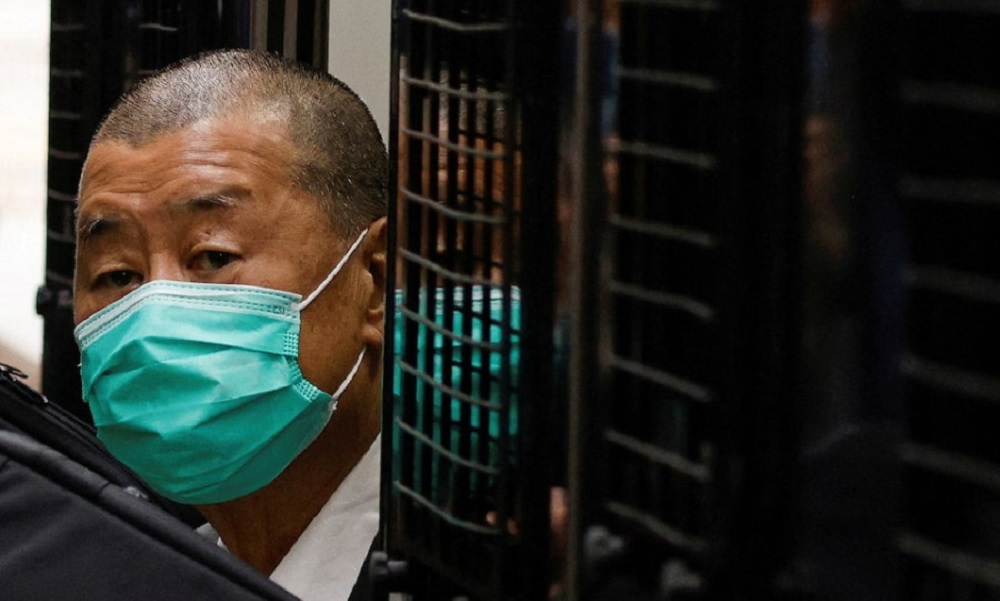
Hong Kong’s most prominent media tycoon Jimmy Lai was sentenced on Monday to a total of 20 years in jail on national security charges comprising two counts of conspiracy to collude with foreign forces and one of publishing seditious materials.
The sentence ends a legal saga spanning almost five years, and Hong Kong’s most high-profile national security hearing. Lai, founder of the now-shuttered Apple Daily newspaper, was first arrested in August 2020 and convicted last year, Reuters reported.
Lai’s sentence of 20 years was within the most severe penalty “band” of 10 years to life imprisonment for offences of a “grave nature”.
The Hong Kong court said Lai’s sentence was enhanced by the fact that he was “mastermind” and driving force behind foreign collusion conspiracies.
The 78-year-old, a British citizen, has denied all the charges against him, saying in court he is a “political prisoner” facing persecution from Beijing.
Lai’s plight has been criticised by global leaders, opens new tab including U.S. President Donald Trump and British Prime Minister Keir Starmer, spotlighting a years-long national security crackdown in the China-ruled Asian financial hub, following mass pro-democracy protests in 2019.
“The rule of law has been completely shattered in Hong Kong. Today’s egregious decision is the final nail in the coffin for freedom of the press in Hong Kong,” said Jodie Ginsberg, CEO of the Committee to Protect Journalism.
“The international community must step up its pressure to free Jimmy Lai if we want press freedom to be respected anywhere in the world.”
Lai arrived to court in a white jacket, with hands held together in a praying gesture as he smiled and waved at supporters.
The case has drawn calls for the long-standing critic of the Chinese Communist Party, who friends and supporters say is in frail health, to be freed.
“The harsh 20-year sentence against 78-year-old Jimmy Lai is effectively a death sentence,” said Elaine Pearson, Asia Director of Human Rghts Watch. “A sentence of this magnitude is both cruel and profoundly unjust.”
Dozens of Lai’s supporters queued for several days to secure a spot in the courtroom, with scores of police officers, sniffer dogs and police vehicles including an armoured truck and a bomb disposal van deployed around the area.
“I feel that Mr. Lai is the conscience of Hong Kong,” said a man named Sum, 64, who was in the queue.
“He speaks up for Hong Kong people, and even for many wrongful cases in mainland China and for the development of democracy. So I feel that spending a few days of my own freedom sleeping out here is better than seeing him locked up inside.”
Starmer raised the case of Lai, who holds British citizenship, in detail during a tête-à-tête with Chinese leader Xi Jinping last month in Beijing’s Great Hall of the People, according to people briefed on the discussions. Britain’s national security adviser, Jonathan Powell, and China’s foreign minister, Wang Yi, were also present.
“I raised the case of Jimmy Lai and called for his release,” Starmer told the UK parliament after his trip.
Trump too, raised Lai’s case with Xi during a meeting last October. Several Western diplomats told Reuters that negotiations to free Lai would likely begin in earnest after he is sentenced, and depending on whether Lai will appeal.
LIFE IN PRISON?
Lai’s family, lawyer, supporters and former colleagues have warned that he could die in prison as he suffers from health conditions including heart palpitations and high blood pressure.
Besides Lai, six former senior Apple Daily staffers, an activist and a paralegal will also be sentenced.
“Jimmy Lai’s trial has been nothing but a charade from the start and shows total contempt for Hong Kong laws that are supposed to protect press freedom,” said the Committee to Protect Journalists’ Asia-Pacific Director Beh Lih Yi.
Beijing, however, says Lai has received a fair trial and all are treated equally under the national security law that has restored order to the city.
World
Trump signs order threatening tariffs on nations doing business with Iran

U.S. President Donald Trump signed an executive order on Friday that may impose a 25% tariff on countries that do business with Iran.
The order comes as tensions between Iran and U.S. continue to simmer even as the two countries engaged in talks this week.
World
Trump rejects Putin offer of one-year extension of New START deployment limits
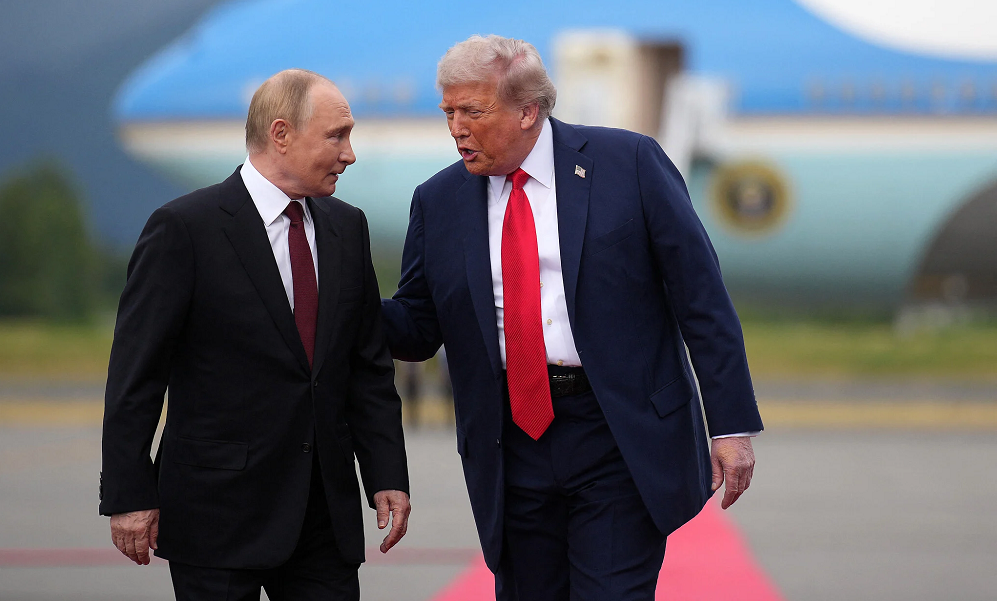
U.S. President Donald Trump on Thursday rejected an offer from his Russian counterpart to voluntarily extend the caps on strategic nuclear weapons deployments after the treaty that held them in check for more than two decades expired.
“Rather than extend “New START … we should have our Nuclear Experts work on a new, improved and modernized Treaty that can last long into the future,” Trump wrote in a post on his Truth Social platform, Reuters reported.
Arms control advocates warn that the expiration of the treaty will fuel an accelerated nuclear arms race, while U.S. opponents say the pact constrained the U.S. ability to deploy enough weapons to deter nuclear threats posed by both Russia and China.
Trump’s post was in response to a proposal by Russian President Vladimir Putin for the sides to adhere for a year to the 2010 accord’s limit of 1,550 warheads on 700 delivery systems — missiles, aircraft and submarines.
New START was the last in a series of arms control treaties between the world’s two largest nuclear weapons powers dating back more than half a century to the Cold War. It allowed for only a single extension, which Putin and former U.S. President Joe Biden agreed to for five years in 2021.
In his post, Trump called New START “a badly negotiated deal” that he said “is being grossly violated,” an apparent reference to Putin’s 2023 decision to halt on-site inspections and other measures designed to reassure each side that the other was complying with the treaty.
Putin cited U.S. support for Ukraine’s battle against Russia’s 2022 full-scale invasion as the reason for his decision.
White House spokeswoman Karoline Leavitt told reporters that the U.S. would continue talks with Russia.
BOTH SIDES SIGNAL OPENNESS TO TALKS
Earlier, Kremlin spokesman Dmitry Peskov said Russia was still ready to engage in dialogue with the U.S. if Washington responded constructively to Putin’s proposal.
“Listen, if there are any constructive replies, of course we will conduct a dialogue,” Peskov told reporters.
The UN has urged both sides to restore the treaty.
Besides setting numerical limits on weapons, New START included inspection regimes experts say served to build a level of trust and confidence between the nuclear adversaries, helping make the world safer.
If nothing replaces the treaty, security analysts see a more dangerous environment with a higher risk of miscalculation. Forced to rely on worst-case assumptions about the other’s intentions, the U.S. and Russia would see an incentive to increase their arsenals, especially as China plays catch-up with its own rapid nuclear build-up.
Trump has said he wants to replace New START with a better deal, bringing in China. But Beijing has declined negotiations with Moscow and Washington. It has a fraction of their warhead numbers – an estimated 600, compared to around 4,000 each for Russia and the U.S.
Repeating that position on Thursday, China said the expiration of the treaty was regrettable, and urged the U.S. to resume dialogue with Russia on “strategic stability.”
UNCERTAINTY OVER TREATY EXPIRY DATE
There was confusion over the exact timing of the expiry, but Peskov said it would be at the end of Thursday.
Russia’s Foreign Ministry said Moscow’s assumption was that the treaty no longer applied and both sides were free to choose their next steps.
It said Russia was prepared to take “decisive military-technical countermeasures to mitigate potential additional threats to national security” but was also open to diplomacy.
That warning was in apparent response to the possibility that Trump could expand U.S. nuclear deployments by reversing steps taken to comply with New START, including reloading warheads on intercontinental ballistic missiles and submarine-launched missiles from which they were removed.
A bipartisan congressionally appointed commission in 2023 recommended that the U.S. develop plans to reload some or all of its reserve warheads, saying the country should prepare to fight simultaneous wars with Russia and China.
Ukraine, which has been at war with Russia since Moscow’s 2022 invasion, said the treaty’s expiry was a consequence of Russian efforts to achieve the “fragmentation of the global security architecture” and called it “another tool for nuclear blackmail to undermine international support for Ukraine.”
Strategic nuclear weapons are the long-range systems that each side would use to strike the other’s capital, military and industrial centres in the event of a nuclear war. They differ from so-called tactical nuclear weapons that have a lower yield and are designed for limited strikes or battlefield use.
If left unconstrained by any agreement, Russia and the U.S. could each, within a couple of years, deploy hundreds more warheads, experts say.
“Transparency and predictability are among the more intangible benefits of arms control and underpin deterrence and strategic stability,” said Karim Haggag, director of the Stockholm International Peace Research Institute.
-

 Latest News2 days ago
Latest News2 days agoAfghanistan to grant one- to ten-year residency to foreign investors
-

 Latest News4 days ago
Latest News4 days agoTerrorist threat in Afghanistan must be taken seriously, China tells UNSC
-

 Latest News5 days ago
Latest News5 days agoUzbekistan, Pakistan advance Trans-Afghan railway project
-
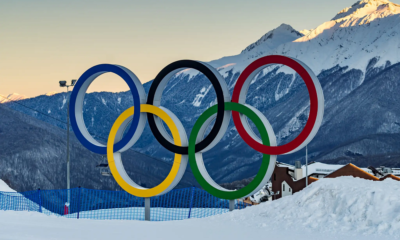
 Sport5 days ago
Sport5 days agoWinter Olympics finally underway, ATN to broadcast exclusively across Afghanistan
-

 Sport5 days ago
Sport5 days agoAfghanistan beat West Indies in final T20 WC warm-up match
-

 Sport3 days ago
Sport3 days agoIndonesia shock Japan to reach historic AFC Futsal Asian Cup final
-

 Sport4 days ago
Sport4 days agoMilano Cortina 2026 Winter Olympics: What You Need to Know
-
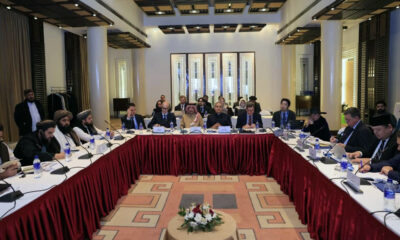
 Latest News5 days ago
Latest News5 days agoAfghanistan hosts 4th Doha Process Counter-Narcotics Meeting, highlights progress


